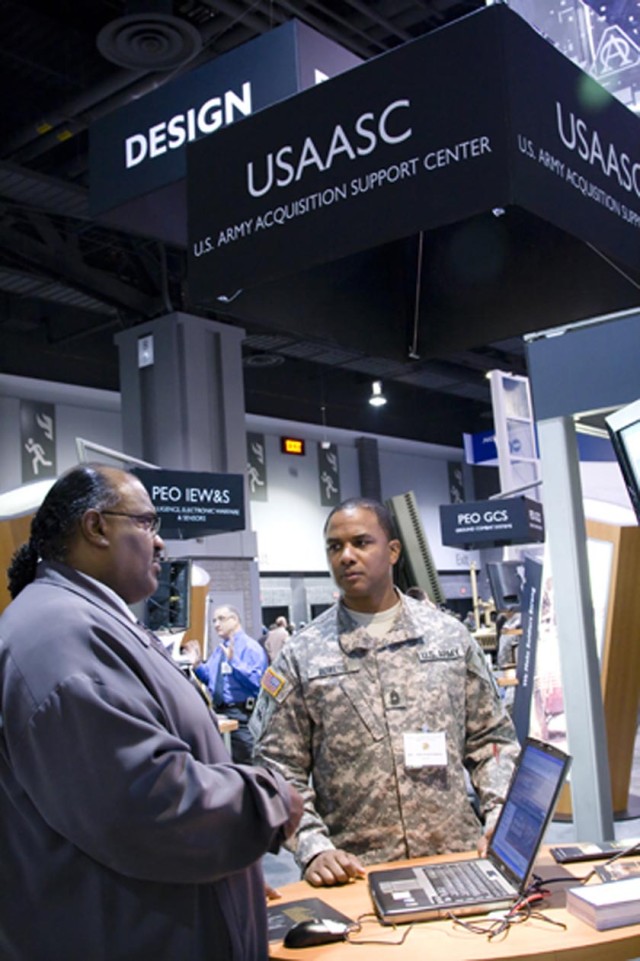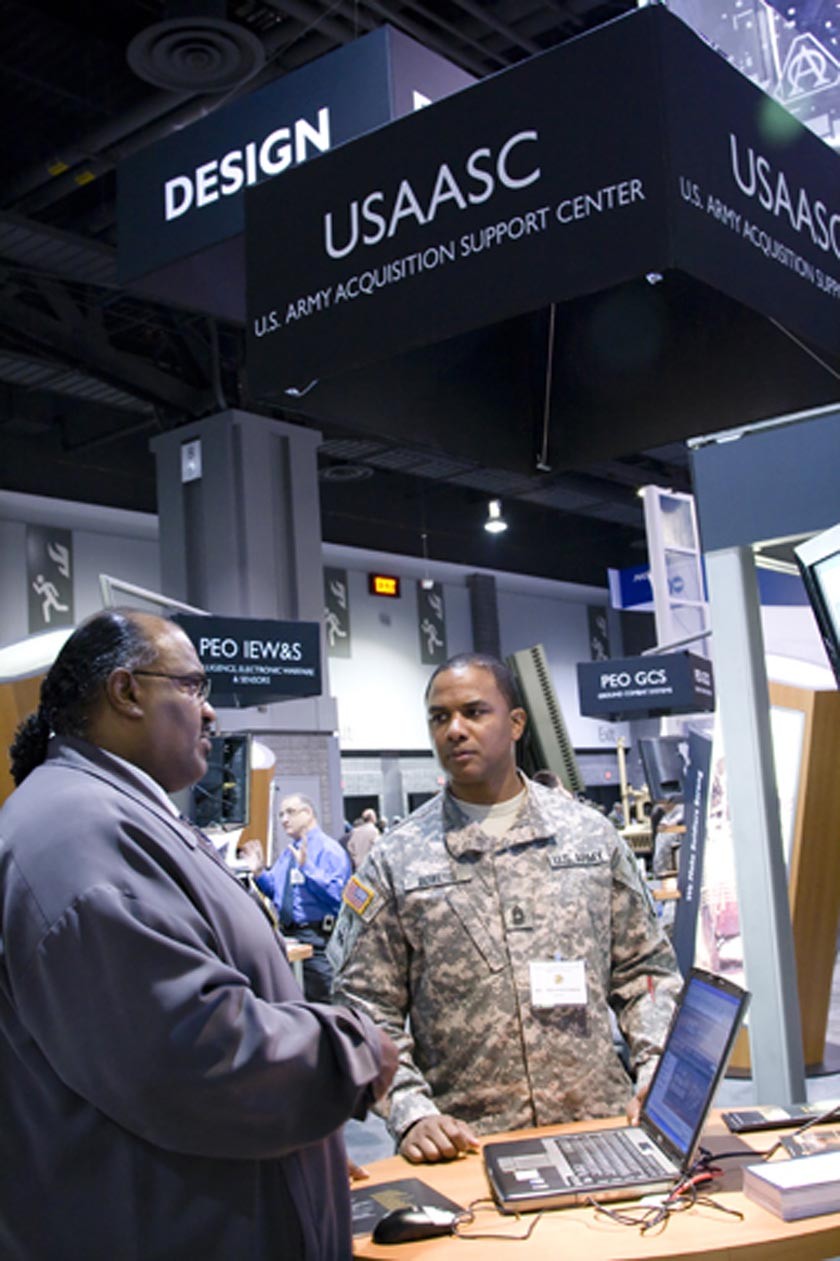
FORT MCPHERSON, Ga. -- Traditionally, becoming an NCO means taking on more responsibility. Sometimes those responsibilities are not only new to them, but are new to the Army, also.
As the Army salutes its "backbone," it is also integrating, training and educating Soldiers with the newest military occupational specialty (MOS), 51C (acquisition, logistics and technology (AL&T) contracting NCO).
These NCOs are more than hand receipt holders for tables, chairs and sticky note supplies. The initial group of Soldiers to reclassify into the new MOS were logistical Soldiers in career fields 92A (automated logistics specialist) and 92Y (unit supply specialist) who performed duties involving request, receipt, storage, issue, accountability and preservation of individual, organizational, installation and expendable supplies and equipment.
The new contracting NCOs will support the Army's increasing need for contingency contracting capability in the modular force and are being assigned to the Army Sustainment Command - formerly the Army Field Support Command - at Rock Island Arsenal, Ill.
At Fort McPherson, Ga., the 610th Contingency Contracting Team works with the Mission Installation Contracting Command to support installation operations by helping to select contractors for services like lawn maintenance, painting and trash pickup. They also support the Soldiers' mission by helping them prepare for current and future missions abroad. Overseas, the mission takes on a greater challenge.
"We are the forward frontline support Soldiers need," said Sgt. 1st Class Jason Hughes, a contract specialist with the 610th. "We procure everything from chairs to concrete sidewalks by hiring the contractors to produce whatever commanders need to be operational when the unit arrives in theater."
Contracting NCOs receive the same Defense Acquisition University (DAU) training opportunities in the contracting field that are available to the Army's acquisition officers and Civilian employees. In the first four to five years of their careers, AL&T contracting NCOs will require more technical training than leadership training because their focus will be on mission support, deployment and contracting statutes, laws and regulations, Hughes explained.
"Interested NCOs need to be self motivated, independent and able to work unsupervised," Hughes said. "Training is hard and negotiation skills are vital. We learn policies, attend ethics and cultural training events and more, since we are always working hand-in-hand with foreign nationals and embassy officials. From a business perspective, what these companies see is an official U.S. government employee. I represent the Army in this uniform - that alone is a lot of responsibility."
The growing needs of the Army require more certified contractors; therefore, NCOs in any career management field, in both the active and Reserve components, who meet reclassification prerequisites for MOS 51C are eligible to apply for reclassification. These Soldiers must be in the ranks of staff sergeant or sergeant first class with less than 10 years of active Federal service. They must submit a recommendation letter signed by a battalion commander (in ranks of lieutenant colonel or higher), copies of college transcripts or a diploma from an accredited institution and copies of training certification related to contract training, if applicable. Each NCO must submit verification of a security clearance, meet height and weight standards according to AR 600-9 (The Army Weight Control Program), exhibit stability in personal affairs as outlined in AR 600-20 (Army Command Policy), be competitive for promotion and have had a successful tour in a leadership role and no derogatory information in their Official Military Personnel File.
Contracting teams are composed of two officers and two NCOs. Once accepted in the career field, contracting NCOs get their hands-on training alongside other Soldiers at established training sites, such as the National Training Center at Fort Irwin, Calif.; Joint Readiness Training Center at Fort Polk, La.; and Yakima Training Center in Yakima, Wash.
"Our teams are on the ground in each of the areas of responsibility before the first servicemembers arrive, and will be the last ones to leave. We support all three phases of a movement: contingency, sustainment and close out," Hughes said.
The teams usually are assigned to the joint command, so it's important they know what units need and a little about the environment Soldiers will enter. "It's our business to support the commanders on the ground - procure lease vehicles from local vendors, get tents, shelters, food and any other force protection and life support equipment necessary,"Hughes said.
The career field is small, with about 300 NCOs with a mission to support the troops. "That mission sometimes requires us to move swiftly and independently," Hughes said. Working with foreign nationals, he said, it's important to know exactly what you want by type, color, size and quantity.
Beyond the stringent selection process used to determine who can reclassify into the contracting field, the Army is careful when handing out taxpayer dollars.
"We are certified and have to be good stewards of government money," Hughes said. "We are out there on our own, quite often, so it takes lots of training. We have to make informed decisions based on market research and a Defense Federal Acquisition Regulation Supplement rating."
Promotable staff sergeants must reclassify into the career field, and with that usually comes a monetary bonus; however, the benefits may outweigh the cash.
"Benefits of this job include gaining skills that are 100 percent transferable to the civilian workforce," Hughes said. "The Federal Acquisition Certification in contracting we receive is the same that Civilians get, plus we get the best hands-on training available anywhere by doing it every day."
Above those two perks, Hughes said, "I can see the fruits of my labor every time the Soldiers get what they need in a timely fashion. Every time a structure is rebuilt because I found the right guys to get the job done. Every time the troops arrive and the facilities are in place for them to walk in and create a temporary home. It's important to me that Soldiers know they can count on me to get what they need. I can procure more commercial, off-the-shelf items instead of them having to wait four months using the General Services Administration system. We take cash and credit with us to those forward locations to take care of things immediately. That's what NCOs do."
For more information on becoming an AL&T contracting NCO, active duty NCOs can call 703-805-2732, send an e-mail message to gregg.rupkalvis@us.army.mil or send inquiries to U.S. Army Acquisition Support Center, ATTN: NCO Proponent (CMF 51), Bldg. 202, 9900 Belvoir Road, Fort Belvoir, VA 22060-5567. Reserve Component NCOs can request reclassification for MOS 51C through Army Human Resources Command-St Louis, ATTN: AHRC-RSE-Q, 1 Reserve Way, St. Louis, MO 63132-5200. Charles Mitchell can be reached at 314-592-0608 or by e-mail message to charles.a.mitchell@us.army.mil. National Guard NCOs should send requests to National Guard Bureau, Acquisition Career Management Officer, ATTN: NGB-ZA-PARC-ACM, 1411 Jefferson Davis Hwy, Arlington, VA 22202-3231. Thomas Drinkwater is the point of contact and can be reached at 703-607-0163 or by an e-mail message to thomas.drinkwater@us.army.mil.

Social Sharing